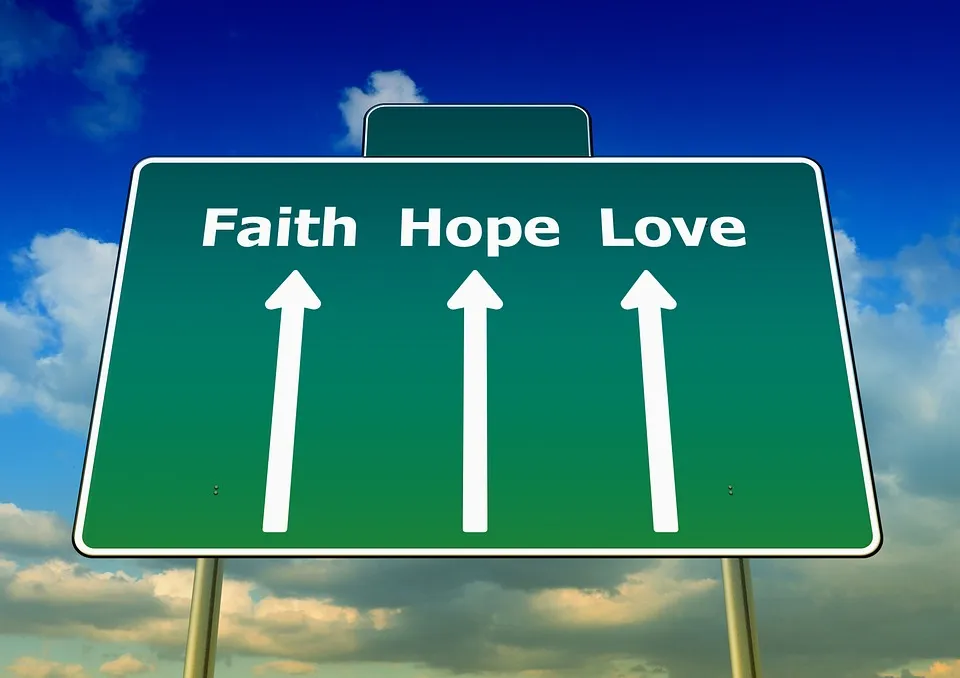Faith and hope are two concepts that are often discussed in spiritual and religious contexts. While they may seem similar on the surface, there are distinct differences between them. In this article, we will explore the definitions of faith and hope, their relationship, and how they impact our lives. Whether you are a person of faith or not, understanding these concepts can help you have a more positive and fulfilling life. Read on to learn more.
Defining Faith and Hope
When it comes to defining faith and hope, it can be challenging to come up with a clear and concise explanation. After all, these are not tangible things that we can see or touch. However, in a religious and spiritual sense, faith and hope are two of the most important concepts we can embrace.

Faith, at its core, is a belief or confidence in something that is not immediately seen or proven. It requires trust and reliance on a power or force greater than ourselves. Faith is often associated with religion and the belief in a higher power or divine beings. However, faith can also apply to our outlook on life and the future. When we have faith in the goodness of people or the possibility of positive outcomes, we are choosing to believe in something greater than ourselves.
Hope, on the other hand, is more closely related to our perception of the future. It is an optimistic attitude or mindset that good things are possible or will happen. Hope is often characterized by a sense of positivity and possibility. It motivates us to continue pushing forward, even in the face of obstacles or challenges.

While faith and hope may seem similar at first glance, there are some key differences between the two concepts.
Certainty vs. Optimism: Faith is characterized by a sense of certainty and conviction, whereas hope is more focused on the possibilities of the future. Faith is grounded in beliefs that are seen as absolute, while hope acknowledges that there is always room for uncertainty and change.
Trust vs. Perception: Faith requires trust and confidence in something that is not immediately seen or proven, while hope is more focused on our perception of the future.
Spiritual vs. Non-Spiritual: While faith is often associated with religion and spirituality, hope can be applied to any aspect of life. You can be hopeful about your career, relationships, or any other area of your life.
Understanding the differences between faith and hope is important in developing a deeper understanding of spirituality and religious beliefs. It can also help us to cultivate a more positive outlook on the future and our individual lives. By recognizing that faith and hope are separate concepts, we can work to develop both in our own lives and work towards a more fulfilling and purposeful existence.
To summarize:
- Faith is the belief or confidence in something greater than ourselves that is not immediately seen or proved.
- Hope is an optimistic attitude or mindset that good things are possible in the future.
- Faith is characterized by certainty and trust, while hope is characterized by perception and possibility.
- Faith is often associated with religion and spirituality, while hope can apply to any aspect of life.
The Relationship Between Faith and Hope
Faith and Hope are two concepts that are often used interchangeably, but they are not the same. Faith refers to the belief in something, usually a divine or supernatural power, while hope is a feeling of optimism and positivity towards the future. Although they are different, there is a close relationship between faith and hope.
The relationship between faith and hope is rooted in the idea that faith gives you confidence, while hope gives you optimism. Faith provides the foundation on which hope is built. When you have faith, you can confidently look towards the future and hope for the best. Faith enables you to believe that good things are possible. Hope, on the other hand, gives you the motivation to keep moving forward, even when things get difficult.
The relationship between faith and hope is best exemplified in the Bible. In the Scriptures, faith and hope are often mentioned together. For example, in Hebrews 11:1, it says, “Now faith is the substance of things hoped for, the evidence of things not seen.” This verse highlights the fact that faith and hope are interdependent. Faith provides the substance or foundation for the things that we hope for, while hope provides the evidence or motivation to keep believing.
Faith and hope are also closely related in terms of their impact on our lives. Both faith and hope provide a sense of purpose and direction. They give us the strength to overcome adversity and the courage to pursue our dreams. Faith and hope help us to see beyond our current circumstances and envision a better future.
Developing faith and hope requires a conscious effort. We need to cultivate a positive attitude towards life and develop a sense of trust and confidence in God and the world around us. This can be achieved through prayer, meditation, and other spiritual practices. It also requires us to surround ourselves with positive influences and to focus on the things that inspire and motivate us.
In conclusion, the relationship between faith and hope is essential for our spiritual and emotional well-being. While they are different, they are intertwined, and both are necessary for a fulfilling life. By developing our faith and hope, we can overcome challenges, achieve our goals, and become the best version of ourselves.
The Differences Between Faith and Hope

Faith and hope are two similar concepts that people often confuse with each other. They work together to help us navigate our lives with a sense of purpose and meaning. However, faith and hope are not the same thing. Understanding the difference between the two can help us strengthen our spirituality and live more fulfilling lives.
Here are some key differences between faith and hope to consider:
Meaning: Faith and hope have two different meanings. Faith is a belief in something that can’t be proven. It’s a deep conviction that something is true, even in the absence of evidence. Hope, on the other hand, is a feeling of expectation and desire for a particular thing to happen. Hope is more focused on the future, while faith is focused on the present.
Attitude: Faith and hope also have different attitudes. Faith is something you have even when things are going wrong. It’s a deep-seated conviction that things will work out, even if you can’t see how. Hope is a more positive attitude that things will get better. Hope is usually what people hold onto when there seems to be no other option.
Certainty: Faith is often a bit more certain than hope. When you have faith, you have complete confidence in something, even if there’s no way to prove its existence. Hope can be more uncertain because there’s no guarantee that what you hope for will happen.
Focus: Faith tends to focus more inwardly, on personal beliefs and spirituality. Hope is more outwardly focused on the future and what’s to come.
Overall, faith and hope work together to help guide us through our lives. Faith gives us a sense of purpose and meaning, and hope encourages us to keep moving forward. Developing both faith and hope can lead to a stronger, more fulfilling spiritual life.
Some ways to develop faith and hope include:
- Practicing gratitude: Being thankful for what you have can help increase your feelings of hope and faith.
- Meditating: Taking time to connect with your spirituality can help you develop a stronger sense of faith and hope.
- Surrounding yourself with positive people: Being around others who have faith and hope can help strengthen your own spirituality.
By understanding the differences between faith and hope, you can work to develop both in your own life. This can lead to a stronger, more fulfilling spiritual journey.
Faith and Hope in Religion and Spirituality
For many people, faith and hope play a significant role in their religious and spiritual beliefs. Faith is the belief in something greater than oneself. It’s the confidence and trust that what we believe is true, even if we cannot see it with our physical eyes. On the other hand, hope relates to the belief that the future will be better than the present. It’s about optimism, positivity, and looking forward to what’s to come.
In most religions, faith is the cornerstone of their teachings. It’s what allows believers to connect with a divine power and to achieve a sense of purpose and direction. For many, faith provides a foundation for their moral and ethical beliefs and shapes their perception of the world around them. In Christianity, faith is the belief that Jesus is the Son of God and that he died on the cross for our sins. It’s also the belief in his resurrection and the hope for eternal life.
Hope plays a different role in religion and spirituality than faith. While faith is about believing in something that exists now, hope is about believing in something that will come in the future. For Christians, hope is about trusting in God’s grace and his promise of eternal life. It’s what motivates believers to keep moving forward, even in the face of adversity. In this way, hope is the fuel that keeps us going, even when times are tough.
Faith and hope are closely related concepts, but they are not the same thing. Faith provides a solid foundation for our beliefs, while hope gives us the motivation and inspiration to keep moving forward. Together, they can have a powerful impact on our lives, helping us to face challenges with confidence and optimism.
If you’re looking to develop your faith and hope, there are many things you can do. Reading scripture, attending church, and prayer are all ways to connect with your faith and deepen your understanding of it. Similarly, focusing on your goals and creating a positive attitude can help you develop a sense of hope for the future. With time and effort, you can cultivate a strong sense of faith and hope that will carry you through life’s ups and downs.

In conclusion, faith and hope are two important concepts that are central to many religious and spiritual beliefs. Understanding the differences between them can help you develop a deeper appreciation for the role they play in our lives. By cultivating your faith and hope, you can achieve a greater sense of purpose and direction, and face life’s challenges with confidence and optimism.
How Faith and Hope Impact Our Lives
Faith and hope play significant roles in our daily lives, influencing our thoughts, emotions, and actions. In this section, we’ll explore how these two spiritual beliefs can impact our lives in negative and positive ways.
Faith and Hope Can Bring Certainty and Confidence
Faith is all about trust, confidence, and reliance on something or someone. It gives us a sense of stability and assurance that things will work out as they should, even if we can’t see it yet. Hope, on the other hand, is all about optimism and positivity towards the future. It can motivate us to take action and strive for something better. Together, faith and hope can create a powerful sense of certainty and confidence that can help us face difficult situations.Faith and Hope Can Provide Grace and Divine Support
In times of trouble, faith and hope can be a source of comfort and support. Faith assures us of the presence and love of a higher power, while hope encourages us to seek that higher power’s help and grace. This divine guidance can help us when we feel lost or helpless, providing us with strength and resilience to move forward.Faith and Hope Can Give Us a Sense of Purpose and Meaning
Faith and hope can give our lives a sense of purpose and direction. Faith can help us uncover our beliefs and values and align them with our actions and behaviors. Hope helps us envision a future beyond our present circumstances and can motivate us to work towards a brighter tomorrow. Together, faith and hope can give our lives meaning and help us find our life purpose.Faith and Hope Can Shape Our Perception and Attitude
Our perception and attitude towards life can be greatly influenced by faith and hope. Faith teaches us to look beyond our present circumstances and focus on things that are eternal and divine. Hope enables us to see beyond the present situation and view life from a broader and more positive perspective. These spiritual beliefs can help us adopt a more positive attitude, find joy in life’s small moments, and see the beauty in every challenge.Faith and Hope Can Create Lives that are Inspiring and Motivating
When we put faith and hope into practice, they can transform our lives into something that inspires and empowers others. These beliefs can be contagious and act like anchors that keep us grounded, even when life gets tough. Faith and hope can help us live a life that is full of purpose, passion, and love, inspiring those around us to do the same.
In conclusion, faith and hope are essential spiritual beliefs that can positively impact our lives. They can create a sense of certainty, provide grace and divine support, give us a sense of purpose and direction, shape our perception and attitude, and create a life that is inspiring and motivating. With these tools in our spiritual toolbox, we can overcome any obstacle and live a life full of grace and purpose.
Developing Faith and Hope
Developing faith and hope is a journey that requires intentionality and investment. It starts with recognizing the power and significance of these concepts in your life and committing to cultivating them. Here are a few tips to help you develop your faith and hope:
Engage with Your Beliefs
Faith and hope are grounded in our beliefs and values, so it’s essential to engage with them regularly. Attend church services, read religious texts, and participate in a community of believers. Developing your faith and hope requires a consistent effort to connect with your spiritual identity regularly.Practice Gratitude
Gratitude is an essential aspect of cultivating faith and hope in your life. Taking time each day to reflect on the blessings in your life helps you develop a positive attitude and strengthens your faith in a higher power. Gratitude helps us recognize the grace and abundance in our lives, encouraging us to trust in the future and maintain an optimistic outlook.Focus on Your Purpose
Understanding your purpose helps you develop faith and hope in your life. When you have a clear sense of what you’re working towards, you can maintain faith in the possibilities of the future. Keep a journal, speak with a mentor, or engage in other reflective practices that help you connect with your values and goals.Take Action
Faith and hope require action to grow and thrive. Invest in your personal and spiritual growth. Attend a conference, take a class, or read material on developing a deeper understanding of faith and hope. Engage in expressive and altruistic activities that allow you to apply your faith and hope in practical ways.Connect With Others
Building a community of like-minded individuals helps you develop your faith and hope. Community encourages accountability, provides opportunities for growth, and fosters meaningful relationships. Develop relationships with people who inspire you and align with your values.

In conclusion, developing your faith and hope is essential to living a fulfilling life. Engage with your beliefs, practice gratitude, focus on your purpose, take action, and connect with others to develop your faith and hope. As you invest in these qualities, you’ll discover a deep sense of peace, purpose, and positivity in your life.
Conclusion
In conclusion, while faith and hope share similarities in their positive outlook and reliance on something greater than ourselves, they are distinct concepts with separate meanings and impacts on our lives. Faith is a belief in something without the need for tangible evidence, while hope is a positive outlook on the future that may or may not be based in reality.
In religion and spirituality, faith is often tied to beliefs in a divine or higher power, while hope can be seen as a manifestation of grace and trust in that power. Both faith and hope can be powerful motivators for individuals, providing conviction and inspiration to persevere through difficult times.
It is important to remember that the development of faith and hope is a personal journey, and one that requires a combination of trust, confidence, and optimism towards the future. By cultivating these values and attitudes, individuals can discover a greater purpose and meaning in their lives, and build connections with others who share similar beliefs.
As Christians, our faith and hope are central to our beliefs and understanding of our place in the world. These values guide us in our interactions with others, and provide a framework for understanding the divine and eternal aspects of our existence. By embracing faith and hope, we can live our lives with greater purpose and positivity, and inspire others to do the same.

So, whether you are just beginning to explore your spiritual beliefs, or have been a part of a religious community for years, it is important to take the time to reflect on the differences between faith and hope, and how they can impact your life in meaningful ways. Through developing these values and beliefs, you can discover a deeper sense of purpose, connection, and joy, and inspire others to do the same.














